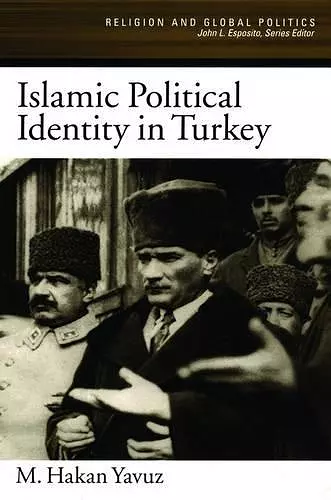Islamic Political Identity in Turkey
Format:Paperback
Publisher:Oxford University Press Inc
Published:24th Nov '05
Currently unavailable, and unfortunately no date known when it will be back
This paperback is available in another edition too:
- Hardback£145.00(9780195160857)

In November of 2002, the Justice and Development Party swept to victory in the Turkish parliamentary elections. Because of the party's Islamic roots, its electoral triumph has sparked a host of questions both in Turkey and in the West: Does the party harbor a secret Islamist agenda? Will the new government seek to overturn nearly a century of secularization stemming from Kemal Atatürk's early-twentieth-century reforms? Most fundamentally, is Islam compatible with democracy? In this penetrating work, M. Hakan Yavuz seeks to answer these questions, and to provide a comprehensive analysis of Islamic political identity in Turkey. He begins in the early twentieth century, when Kemal Atatürk led Turkey through a process of rapid secularization and crushed Islamic opposition to his authoritarian rule. Yavuz argues that since Atatürk's death in 1938, however, Turkey has been gradually moving away from his militant secularism and experiencing "a quiet Muslim reformation." Islamic political identity is not homogeneous, says Yavuz, but can be modern and progressive as well as conservative and potentially authoritarian. While the West has traditionally seen Kemalism as an engine for reform against "reactionary" political Islam, in fact the Kemalist establishment has traditionally used the "Islamic threat" as an excuse to avoid democratization and thus hold on to power. Yavuz offers an account of the "soft coup" of 1997, in which the Kemalist military-bureaucratic establishment overthrew the democratically elected coalition government, which was led by the pro-Islamic Refah party. He argues that the soft coup plunged Turkey into a renewed legitimacy crisis which can only be resolved by the liberalization of the political system. The book ends with a discussion of the most recent election and its implications for Turkey and the Muslim world. Yavuz argues that Islamic social movements can be important agents for promoting a democratic and pluralistic society, and that the Turkish example holds long term promise for the rest of the Muslim world. Based on extensive fieldwork and interviews, this work offers a sophisticated new understanding of the role of political Islam in one of the world's most strategically important countries.
"This is an important book, which not only examines the relation of Islam to politics anew and from a very different perspective but also provides a fresh look at Turkish politics. For those who are interested in state-society relations, it provides a wealth of information with historical depth of direct relevance to the theoretical discussions on the subject."--Comparative Politics
"For a very long time, we were accustomed to thinking that Islam in general and political Islam in particular were fundamentally opposed to the realization of the basic aims and ideals of Turkish modernization. The social and political transformations that took place in Turkey in the 1980s and the 1990s have shown, however, that far from constituting a contrary force, Islam now plays a decisive role in the success of Turkish modernization in the broader and universal sense of the term. In this important book, Hakan Yavuz explains how Islamic identity came to occupy such a central place in modern Turkey. The first hand observations and interviews with leading intellectuals and community leaders give this book an original and engaging quality that is sure to make it an indispensable source for understanding modern Turkey."--Resat Kasaba, University of Washington; author of The Ottoman Empire and the World Economy
"Professor Yavuz's sterling work illuminates recent republican Turkish history and society far more comprehensively and insightfully than do any recent works in either English or Turkish which have come to my attention. His impressive interdisciplinary research is likely to prove profoundly influential in its analysis of the increasingly important role of Islam in Turkey, and in its broader comparative scholarship for its more general theoretical and practical significance in the study of Islamic movements in other modernizing societies in the Muslim world."--Howard A. Reed, Professor of History, Emeritus, University of Connecticut; co-founder, Turkish Studies Society, Honorary Member, Turkish Historical Society
"M. Hakan Yavuz, a leading scholar of Turkish politics, has written richly documented and valuable comprehensive analysis of Islamic social movements in Turkey . This book will becoms must-reading for both scholars and students of contemporary Islamic democratization in Turkey and the rest of the Islamic world."-- Middle East Policy Council
"This is the most comprehensive book I have seen on Islam in the public sphere of Turkey in recent years. Yavuz not only provides a succinct religious map of Turkey but also examines the dynamics of religious change its within social and political context. His detailed study of the content and context of Islamic movements in Turkey is a major contribution. The book provides excellent connections between opportunity spaces and the shifting boundaries between Islam and secularism, public and private, and global and local."--Umit Cizre, Bilkent University, Ankara
ISBN: 9780195188233
Dimensions: 161mm x 235mm x 18mm
Weight: 494g
342 pages